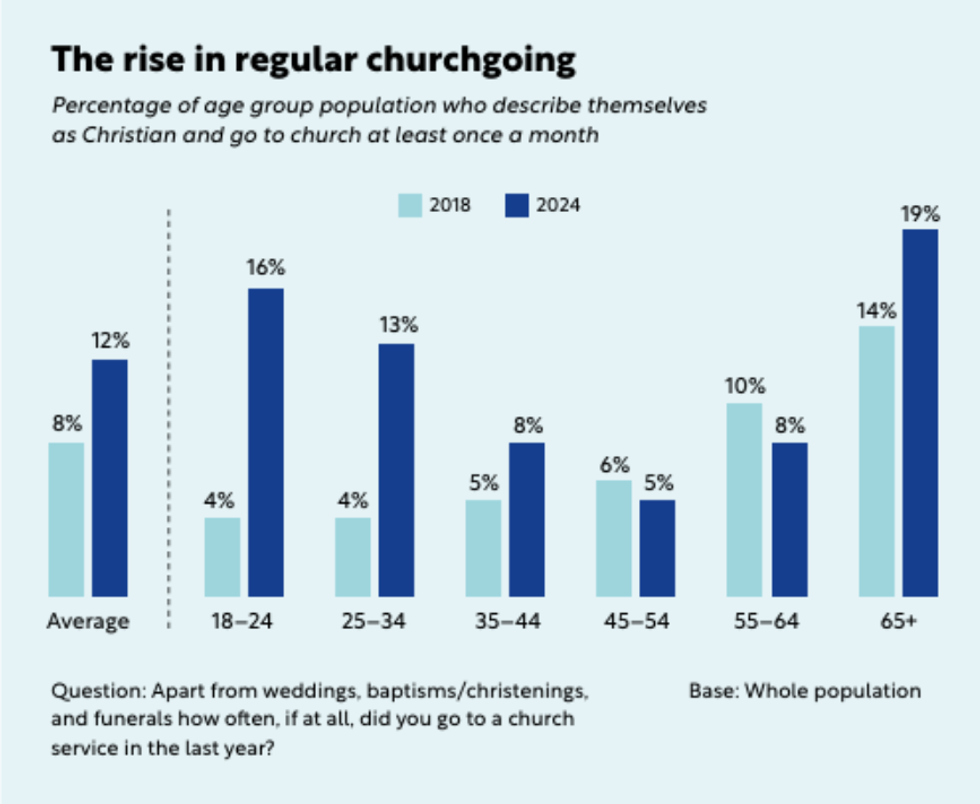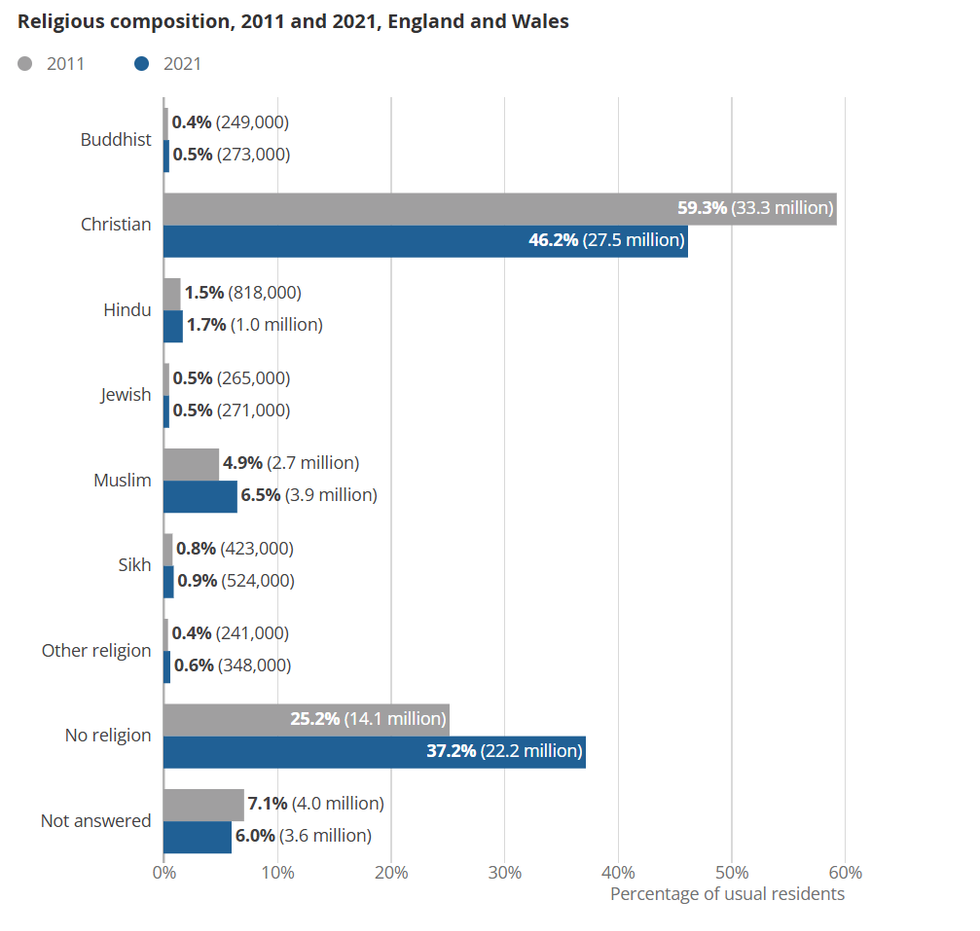Why has Silicon Valley fallen for Christianity? - Colin Brazier
OPINION: GB News commentator Colin Brazier on the surprising resurgence of Christianity in young people
Don't Miss
Most Read
Latest
An old friend quite calmly last week told me that she had seen a ghost. I take what she said seriously for several reasons.
First, she is a very clever and successful writer of books. Second, she is the last person to gild the lily in search of a punchline. Third, the vision was simultaneously witnessed by her grown-up daughter.
I have never seen anything similarly inexplicable. But I’m loathe to say that that is where the matter rests.
My friend’s account isn’t the first depiction of a supernatural encounter to be shared with me. By now, in my fifties, I can think of several.
Some, almost certainly bogus, repeated third-hand, often in drink. Others, far more plausible, reluctantly offered up by people who were naturally suspicious of being labelled a fantasist.
Funny then, that we fifty-somethings are the ones least open to the idea of life moving in mysterious ways.
This week a big study of more than 10,000 Britons found that hostility to faith is most marked in the 45-54 age group. Theirs is the cohort, for instance, least likely to attend church other than for weddings, funerals and baptisms.
I’m not surprised. Many of my contemporaries think Christianity is bunk at best, a vehicle for abuse at worst.
I know of Catholics who’ve stopped taking communion because of repeated paedophile scandals. Anglicans who despair of a hierarchy more interested in paying reparations for slavery, than fixing church roofs.
But that same study also found something remarkable. The young are going back to church. Not in legions, but enough to suggest a shift.
Over the last six years the number of young men reportedly attending church at least once a month has risen from 4 to 21 per cent, with a smaller but still substantial rise (4 to 16 per cent) for young women.

Church attendance
Anglican Ink
What’s going on? Part of the answer is demographic, a function of more Godly people moving here. It’s not just Eastern Europeans going to Mass, or the rise in Pentecostalism fuelled by arrivals from Africa, but less obvious influxes, including those from China (Christian population 67m and rising).
But what about those born here? Is their newfound interest something to do with being raised in a culture in which Christian moral teachings, once a given, are now virtually unknown?
Is it revulsion with the self-loathing woke ideology that’s replaced it? Was G.K. Chesterton right when he predicted that when people stopped believing in God, they don’t start believing in Nothing. They start believing in Anything.
The report’s authors speculate that there is “a deep search for meaning, order, and belonging related to poor mental health among younger generations”.
From Roger Scruton to Bijan Omrani, there is no shortage of thinkers who’ve seen this coming. In ‘Dominion: The Making of the Western Mind’ (2019) the historian Tom Holland warned us not to forget how Christianity forged many of the freedoms we have come to take for granted.

Elon Musk has called himself a 'cultural Christian'
PAAnd then there’s Jordan Petersen, who last year published ‘We Who Wrestle With God’, a remarkable book that argues the Bible is full of stories that, while not always true in a way we would understand, do condense the wisdom of ages into a manual for managing life’s hazards.
I briefly served alongside Petersen on an advisory committee set up to launch the Alliance For Responsible Citizenship (ARC), an organisation which explicitly argues for the West to rediscover its Judeo-Christian roots in order to survive.
Where once these arguments were left to Trad-types and counter-cultural fogey’s like Peter Hitchens (The Rage Against God, 2010), those arguing for the restoration of Christian values are now more likely to be ‘tech bros’ like Peter Thiel or Elon Musk (a self-styled ‘Cultural Christian’).
It’s a measure of how the tectonic plates are moving that one of the main articles in this month’s Vanity Fair magazine reads: “Christianity Was Borderline Illegal in Silicon Valley. Now It’s the New Religion”.
Today is Palm Sunday, the start of what Christians consider to be their Holy Week in the run-up to Easter Sunday. Time was when these punctuation marks in the Christian calendar were the points around which the liturgical year turned, with significance that was universally understood.
A glimmer of enlightenment, not least thanks to those tech bros in Silicon Valley, is only ever a keyboard stroke away. The most common question on Google this week again will be: “Why is Good Friday good?”
For some people, particularly the young, that might be the start of a lifelong search for meaning in Christ.
LATEST MEMBERSHIP OPINION:

Religion in the UK 2011 VS 2021
ONS
But what about my generation? Is there any reaching the Boomers? The last generation raised in a country which was reflexively Christian.
The ones who went to schools where RE meant Bible study, Morning Assembly meant hymns and the Lord’s Prayer was something everyone could recite from memory.
Does Christianity offer anything for them? I have no talent for Apologetics (defending the Faith), but even I know that there are some arguments Christians shouldn’t duck.
I remember listening to a fellow Catholic in a church hall about 20 years ago, who bizarrely was arguing that religion was the cause of all wars. This ignores the brute reality of the 20th Century, in which 100m people were killed by ideologies (Nazism, Stalinism, Maoism) that explicitly repudiated Christianity.
And if the past has no purchase, try the future. I have a feeling that, in coming decades, Christianity will become a shield against the twin challenges of the age: aggressive secularism and Islamism.
The former, at least for now, endows Christians with protected characteristics as a result of the Equality Act 2010. The latter, at least notionally, is prepared to co-exist with fellow People of the Book (although this co-existence is not always peaceful, as many Jews can attest).
Most of all, I think, Christianity has a key role to play in the biggest crisis we face. Not religious terror, nor woke degeneracy. But the coming population crash.
As a demographer friend of mine says, declining birth rates are not, first and foremost, a product of the cost of living (he points to Scotland - which has the cheapest housing in the UK whilst also having the lowest birth-rate).
Fertility, at bottom, is downstream of culture. A society with a sense of moral destiny is more inclined to produce a next generation than one which doesn’t.












